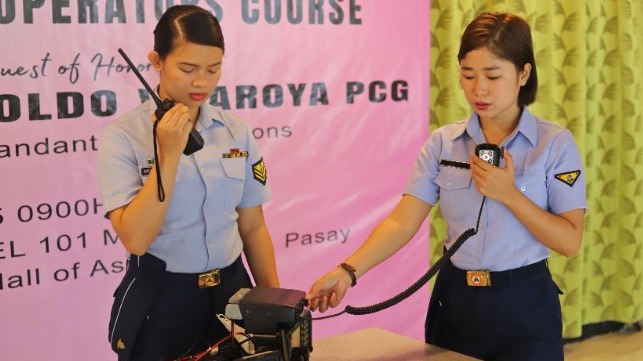Philippine Coast Guard Picks Women to Talk to China's Maritime Militia

When Alexander Graham Bell hired his first female telephone operators in 1878, he launched a long legacy of hiring preference in switchboard rooms and telecommunications. Big Tech's digital assistant systems - Siri, Cortana, Alexa and OK Google - still come with default female voices (at least in the North American market). The same pattern now extends to maritime diplomacy: the Philippine Coast Guard believes that intruding Chinese vessels respond best when radio instructions are delivered by females, and it is adjusting its operations accordingly.
To capitalize on this concept, the PCG has launched an all-female radio operators course, and it recently graduated its first cohort of designated "Angels of the Sea." Graduates will serve aboard PCG vessels and with shore-based units, where they will fulfill a special-purpose mission of "communicating with foreign ships so as not to elevate tension." Female voices convey "the authority of wives or mothers that pervades the Asian culture," according to Rear Adm. Ronnie Gil Gavan, who created the new program.
In one instance, PCG coastal radio operator Gretch Mary Acuario told local media, seven Chinese vessels near disputed Sabina Shoal left promptly when she challenged them over the radio. (She added that she thought it made no difference whether the operator was male or female.)

that matters most
Get the latest maritime news delivered to your inbox daily.
The program has attracted criticism for a "shallow" understanding of gender equality in military service - that is, its selection of one gender for a culturally-determined role - but it is in operation nonetheless. Some members of the first Angels of the Sea class are already assigned to PCG vessels in sensitive parts of the West Philippine Sea (Manila's term for its EEZ claim in the South China Sea).
The PCG is on the front lines of the Philippines' effort to prevent annexation of the waters and land features within its exclusive economic zone. Chinese forces began occupying reefs and islands in the Spratly archipelago in the early 2010s, building massive air and naval bases on reclaimed land, complete with strategic runways and air defense systems. In March, hundreds of Chinese maritime militia "fishing" vessels massed at Philippine-claimed Whitsun Reef, raising fears that Chinese forces would transform the shoal into another base complex. After diplomatic protests from Manila, the flotilla dispersed, but maritime tensions between China and the Philippines continue.
